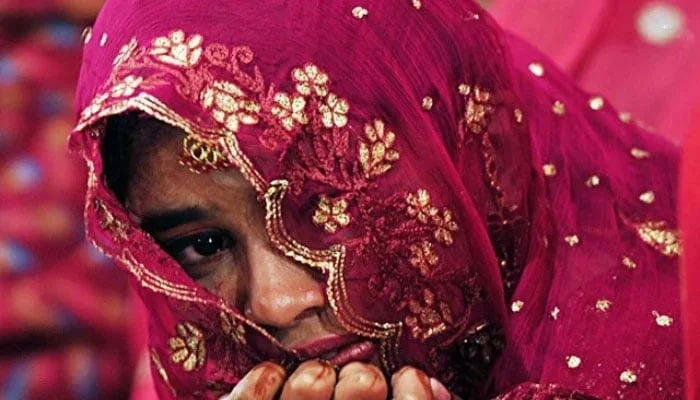Child brides
Every year, millions of girls silently say goodbye to their education and the promise of a better career and get married
Around 18.6 million girls in Pakistan get married before reaching the age of 18, and 4.6 million girls get married before the age of 15. To understand how big the 18.6 million figure is, consider this: 20 million people work and live in Karachi. Every year, millions of girls silently say goodbye to their education and the promise of a better career and get married. While officials have tried to fix the legal age for marriage, they have failed to implement a uniform policy across the country. Sindh is the only province, for example, which sets a uniform minimum age for marriage at 18 for boys and girls under the Sindh Child Marriage Restraint Act, 2013. While other provinces also ask the groom to be at least 18 years old at the time of marriage, they are lenient about the bride’s age, allowing 16-year-olds to get married. Now, in a welcome move, the Lahore High Court has struck down the section that deals with gender-based age distinction in the Child Marriage Act, 1929 – and ordered the Punjab government to revise the legislation.
The court has also observed that while setting the minimum age for marriage, the government has to consider social and educational factors. Most people dismiss the concerns on religious grounds. However, in the Ali Azhar case, the Federal Shariat Court held that the “minimum age limit provides a reasonable time period to girls to complete basic education at least, which normally helps in developing mental maturity (rushd) in a person.” But child marriages remain common across the country – in rural areas, where some parents see their girls’ marriage as a way to provide some security to their child, and in urban cities where regressive thinking is still rampant.
Our girls have a lot of potential. Child marriages are a way to clip their wings, forcefully making them conform to societal values and beliefs. Around the world, girls are coming up with innovative products, but in Pakistan, girls remain restricted inside their homes. By the age of 18, girls rarely complete their high school diploma. After their marriages, they are entirely dependent on their husbands, relying on the generosity of their in-laws to cover their expenses. Often, girls embrace motherhood a year after the marriage. The fragile and weak bodies of young mothers end up creating health challenges for both the child and the mother. Governments come and go; political leaders make impassioned speeches during election campaigns – but all promises made to empower women are forgotten as soon as a government assumes charge. As the country remains stuck in the cycle of political blame game, millions of girls are left abandoned. Pakistan has to decide once and for all: is it ready to empower women so that they can contribute to the economy or does it want to continue to isolate a half of the country’s population?
-
 Hilary Duff’s Son Roasts Her Outfit In New Album Interview
Hilary Duff’s Son Roasts Her Outfit In New Album Interview -
 Alexandra Daddario, Andrew Form Part Ways After 3 Years Of Marriage
Alexandra Daddario, Andrew Form Part Ways After 3 Years Of Marriage -
 Eric Dane Rejected Sex Symbol Label
Eric Dane Rejected Sex Symbol Label -
 Avan Jogia Says Life With Fiancee Halsey Feels Like 'coming Home'
Avan Jogia Says Life With Fiancee Halsey Feels Like 'coming Home' -
 Kate Middleton's Role In Handling Prince William And Harry Feud Revealed
Kate Middleton's Role In Handling Prince William And Harry Feud Revealed -
 Tucker Carlson Says Passport Seized, Staff Member Questioned At Israel Airport
Tucker Carlson Says Passport Seized, Staff Member Questioned At Israel Airport -
 David, Victoria Beckham Gushes Over 'fiercely Loyal' Son Cruz On Special Day
David, Victoria Beckham Gushes Over 'fiercely Loyal' Son Cruz On Special Day -
 Taylor Swift Made Sure Jodie Turner-Smith's Little Girl Had A Special Day On 'Opalite' Music Video Set
Taylor Swift Made Sure Jodie Turner-Smith's Little Girl Had A Special Day On 'Opalite' Music Video Set -
 Eric Dane Says Touching Goodbye To Daughters Billie And Georgia In New Netflix Documentary
Eric Dane Says Touching Goodbye To Daughters Billie And Georgia In New Netflix Documentary -
 Channing Tatum Reveals What He Told Daughter After Violent Incident At School
Channing Tatum Reveals What He Told Daughter After Violent Incident At School -
 King Charles Lands In The Line Of Fire Because Of Andrew Mountbatten-Windsor
King Charles Lands In The Line Of Fire Because Of Andrew Mountbatten-Windsor -
 Denise Richards Doubles Down On Abuse Claims Against Ex Husband Aaron Phypers Amid Show Return
Denise Richards Doubles Down On Abuse Claims Against Ex Husband Aaron Phypers Amid Show Return -
 Russia Set To Block Overseas Crypto Exchanges In Sweeping Crackdown
Russia Set To Block Overseas Crypto Exchanges In Sweeping Crackdown -
 Gwyneth Paltrow Reveals Deep Personal Connection With Kate Hudson
Gwyneth Paltrow Reveals Deep Personal Connection With Kate Hudson -
 Prince Harry, Meghan Markle’s Game Plan For Beatrice, Eugenie: ‘Extra Popcorn For This Disaster’
Prince Harry, Meghan Markle’s Game Plan For Beatrice, Eugenie: ‘Extra Popcorn For This Disaster’ -
 OpenAI To Rollout AI Powered Smart Speakers By 2027
OpenAI To Rollout AI Powered Smart Speakers By 2027




